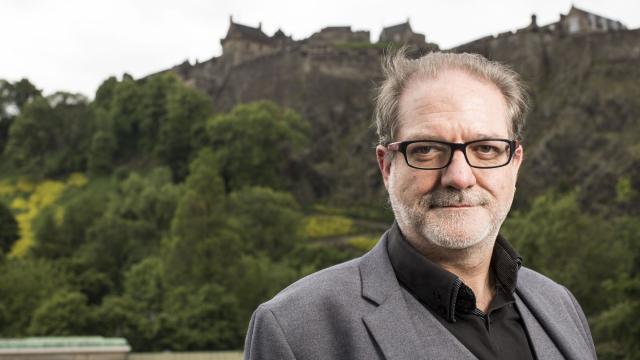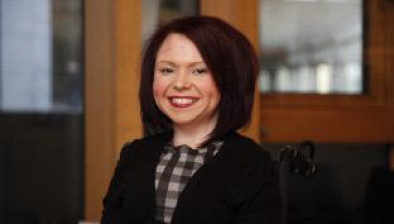Housing Bill part 2: Homelessness prevention duties - podcast transcript

Ewan Aitken
Below is a full transcript of episode 55 of the Scottish Housing News Podcast titled ‘Housing Bill part 2: Homelessness prevention duties with Ewan Aitken’. Listen to the episode here.
Kieran Findlay
Hello and welcome to the Scottish Housing News Podcast. I’m Kieran Findlay, the editor of Scottish Housing News and with me is former Dundee housing convener, Jimmy Black.
There’s nothing like a bit of political turmoil to interrupt our planned series of episodes on the recently published Housing Bill. But there are still important issues in play here and none more so than homelessness. The proposed legislation will introduce an ‘Ask and Act’ duty on social landlords and other bodies, such as health boards and the police, to ask about a person’s housing situation and take proactive steps to avoid them becoming homeless wherever possible.
Jimmy Black
So, putting Holyrood to one side, in this episode we’re asking what could these proactive steps involve? Do the measures go far enough or are they asking too much of already stretched resources? So to provide the answers we’ve reached out to Ewan Aitken, the chief executive of homelessness charity Cyrenians.
Ewan co-chaired the Homelessness Prevention Task and Finish Group on whose report, arguably, the new Housing Bill is based, or at least the homelessness part of it.
So Ewan, the task group’s report said that not all public bodies, third sector and private organisations reflect and embed a culture where the needs of people are put ahead of process or systems. What did you mean by that?
Ewan Aitken
First of all, it’s good to be here. Thanks very much for having this kind of conversation. We’re going to have to have lots of these conversations if this stuff is going to work.
What we meant was that too many bits of the system work in silos. People go, this is my job, I do my bit, and I’m not actually going to pay attention to the impact of what I do on others. Or ask what others do to mean that I can improve what I do. Or there are institutional barriers, data sharing, for example, that cause difficulties in making sure that people are collaborating properly.
So you end up with people coming to one bit of the system getting one thing that they present with, dealt with, whether it’s addictions or learning challenges or whatever it is, and not pay attention to the other things that could be dealt with if we had a conversation with that person in the first place they presented.
Jimmy Black
So if we’ve understood things correctly, organisations like the police, health boards and others will have a duty to ask and act to find out if someone is homeless or threatened with homelessness. So, let’s look at a practical situation. Let’s say someone having a mental health crisis is taken to accident and emergency by the police. What should A&E and the police be doing in practice?
Ewan Aitken
I think it’s a really, really good example. And I suppose the first question is, who is it that should be doing the asking? Should it be the police or the health service in that context? And in many senses, the answer lies in who can create the right relationship and who’s got the time to the time to do that. The really significant thing here that has been played to, the strength that has been played to, is the ability of public services to be in relationship with people. That’s an asset. And if, even in a short time, a trusted relationship can be created, then that conversation about other things can happen.
So in the context that you described, I would suggest it’s probably more likely that the health service rather than the police would be the place for that conversation to happen because it’s more like if the person’s admitted at the hospital, that there’s the time to begin to have that relationship, whereas the police would be involved in a context where there’s maybe some conflict or some difficulty that caused them to be called in the first place. So you’re less likely to have that relationship. So the person’s in hospital, and as it happens, we run a service that gives you an example of this.
A person’s in a hospital. You’re dealing with a mental health thing, but during the course of that conversation, staff should be also trained to inquire about somebody’s housing circumstances and whether there’s a level of instability there. And if there is, then they need to know where to go. And I say they need to know, it’s not, we need to help them know how they can ask for help.
Now, as it happens, we run a service called the Hospital Inreach Service where we’ve got staff embedded in hospitals in the Western General and in the Royal Infirmary in Edinburgh and just about to go to the Royal Edinburgh, where people may end up in the scenario you suggest. And when that’s flagged up to them, their job is to work with people on their housing circumstances. So you’ve got a connection between them. But nursing or medical staff know that if this comes up in conversation, our team are the ones to work with.
Because that’s not the case across hospitals across the country. So medical staff need to know, right, this person’s indicating that part of the challenge they’re facing is in unstable housing. Where do I need to turn? And that’s why the bill does what we ask them to do, which is it separates ask and act. In other words, the person asks, they find out, and then they say, I need to get these people to act to provide the support before we get to a referral. Because what we’re trying to avoid is increasing the number of referrals to homelessness services.
But if you can get that support, then we can really prevent things happening at a point of intervention.
Kieran Findlay
Ewan, when it’s clear that someone is homeless, then agencies will have a duty to do what they can to help homeless people find a solution. And if they can’t, they must apply on their behalf to the local council’s homelessness service. As far as we understand it, it’s slightly different for people threatened with homelessness. Agencies must then act to minimise the threat and do what they can to prevent it.
I suppose for a housing association that could mean providing the next available house to that person.
Ewan Aitken
So, interestingly, housing associations are in an odd place. They are one of the reasons why the duty is on relevant bodies rather than public bodies because they’re not technically a public body. The question though is how do you do this in a person-centred approach? What does that person need? So it may be that they come across somebody through their wider community action requirement who requires housing but it may be that they’re not the right people to provide that housing and it’s not to be seen as a form of queue jumping so that in other words, well we’ve got a house they have to have it, it’s more what does this person need where’s the best place for them to stay, where would be the right people to provide that house.
But of course, if it’s permission of a house, that would require them to go through a referral process into the homelessness system. And to get that, this is about helping people stay in the accommodation they’re in, rather than looking to provide new accommodation. That may be what the conclusion is, and that would require a referral. But this first stage is working out how we can help somebody stay where they are.
Jimmy Black
Agencies will have to have regard to homelessness and any guidance issued by government, I guess, so that the way that they operate should not lead to homelessness. What does that mean for housing associations who on occasion need to evict tenants for rent arrears or anti-social behaviour?
Ewan Aitken
So I think that’s a good question, but one that is less about this bill and more about the requirements of a housing association.
But any housing association in that circumstance would have a responsibility to say, if this person needs to leave where they are, how do we make sure that we’re not evicting them to homelessness? However, if they were losing their home, that would be a requirement to take a referral to homelessness services to take them into that system. This is what I tried to avoid. So what are the ways in which they could look to get support? So either that behaviour pattern or that financial circumstance can be dealt with earlier. And that’s one of the reasons why this thing about, you know, somebody getting a referral six months earlier actually appears to be increasing the number of referrals but actually is trying to say we need to intervene earlier to stop us ending up in that bad situation in the first place.
So if the housing association has done everything they can to deal with those behaviour patterns or that financial circumstance and eviction is required, then that would become a referral and therefore would be, as I say, in a sense the normal process rather than what this Act is aimed at. This Act is aimed at trying to find the ways in which somebody whose circumstances mean they would like to be homeless don’t become homeless in the first place.
Kieran Findlay
Prisoners leaving custody have the protection of SHORE, in other words, sustainable housing on release for everyone. What about patients leaving hospitals or other residential health care, drugs or alcohol rehabilitations for example?
Ewan Aitken
Well, we should be in the position where public services have the support around them and the ecosystems around them that mean they do not leave a public service into homelessness. The challenge you’ve got is a public service generally speaking has a fairly specific task. Prison being a good example, we’re going to lock you up for this length of time and then you move on. Hospitals we can do so much with you clinically and then you move on. The care system is another example. You’re in care for a period of time and then there needs to be a transition to something else.
What we need to be doing is ensuring that when people are being looked after for reason A, but instability of housing is identified, we can use that connection to make sure that that instability is dealt with. And so the SHORE standards are a good example. I mean, we have a service where we support people about to come out of the jail for life. We have all that teed up before they leave so they don’t leave into homelessness. And that’s through the SHORE standards. I mentioned the hospital in-reach team that we have as well.
But we need to first of all train the staff and the public service to have that appropriate conversation so they can work out whether there’s instability of housing and then provide them with the ecosystem around their public service so they can go right, this person has identified this and this is the reason these are the people I need to go to. And that’s why these things will take time because they need time to be doing training and you need to build round each public service the ecosystem that allows the staff, having been trained to have that conversation, nowhere to turn to when they’ve identified the issue that needs to be dealt with underlying or in addition to the reason they presented at that public service in the first place.
Jimmy Black
Ewan these duties will implement recommendations from the Homelessness Prevention Task and Finish Group. But do they differ at all from what was put forward by the group? Or did the government miss anything out? Are they exactly what the group members had put forward in the report? You did mention Social Security Scotland, for example, and that’s not included as a relevant organisation.
Ewan Aitken
The bill as it is, is in danger of being a framework bill, you know, in other words, it’s a bunch of pounds but not a lot of detail. As is always the case, the detail will really lie in secondary legislation and guidance and that’s where we’ll get an answer to a number of these questions. The problem with the social security system is that the real driver and the real point of contact frankly is the DWP and they are not a body under the auspices as you know of the Scottish Parliament and so there’s negotiation to be done to help to get them on board. And actually, interestingly, talking to DWP, they want to be on board, but they can’t have a duty placed upon them. But they know that if they are on board, they’ll actually get their own jobs done, be able to do their own jobs better. And if we do that, we’ll then get Social Security Scotland on board as well.
So the bill frankly in its present form is light, but talking to the civil servants, they have committed to involving third-sector organisations and other parts of the public sector in the drafting of the secondary and writing of the guidance and that’s where I think these answers will be dealt with. It is a risk, it’s always a risk if you haven’t got it in paper in front of you but the other side of the coin is if you put too much in primary legislation it’s much harder to change if it’s in secondary or in guidance and you realise you didn’t get that bit right, you can make changes more quickly. So we have to trust that process, that participation in that process will be loved up to, as promised.
Jimmy Black
Do you think this bill will be successful in persuading people in IJBs, for example, integrated joint boards, that homelessness is actually something to do with them?
Ewan Aitken
Well, I think that’s almost another question. They, of course, are under a sense of limbo because of the macerations around the National Care Service and what’s going to happen there. The minister, Marie Todd, wrote to the President of the IJBs saying that she, whilst it was possible under the 2014 Act that they could take on homelessness, she did not expect that to be the case. I have to say I would challenge that, given that they’re going to be responsible for so many other parts of the reasons why people become homeless, whether it’s mental health, whether it’s drugs and alcohol, or if they take on more children’s services or even criminal justice services as they’re suggesting.
To your point of how we’re going to persuade people that they need to be part of this, the principle of this is that it is everybody’s issue and everybody needs to be involved in it and they need to understand that by joining up what they do with other people, what other people do, that’s when these conversations should let happen, they’re all able to do their jobs better because people get help when they need it and the right kind of help in the way that’s best for them and that surely needs to be a good thing. But yeah, I think until the National Care Service stuff is sorted out, that’s an inherent landscape weakness in the whole process.
Kieran Findlay
Ewan, unless we clone your good self, your charity and all the services that they provide, this is going to take a huge amount of resources and training, not just at the local authorities, but the other bodies that are mentioned in this. What is it going to take to reach the level of service that would be required to follow these programmes through?
Ewan Aitken
Well, I can tell you it will take far more than the financial memorandum as it is, which suggests that each local authority, and only local authorities, would get £60,000 each, which would just be bonkers.
What it needs is not just money and it absolutely needs money, but it needs time. It needs time to train folk, time to look at each of those public services that will have this duty and ask what do they need around them? What knowledge do they need to know what is already there? And what do we need to reconfigure so that they can have what they need? And obviously the same service can provide that for lots of different places in a community, but each community is different. And once we have that, then implement the duty.
One of the key things is that the duty can become law but is not imposed for a period of time so you can do these other things. And these public services need to know how do they access the training for folk, how do they keep that going for folks so they’re constantly doing refresh and how do they pay for that training as well because they’ll need time for those staff to do that and that has cost it as well in addition to making sure that each of those public services have the right ecosystem around them.
So no, it’s a revolution frankly. It’s a revolution in approach that will take time and money. And I think people know what it is, but whether they have a plan to deliver it yet is one of the questions that we need to keep asking.
Kieran Findlay
You talk about a public health approach to homelessness, stating that taking that view is so key to tackling the housing crisis. Cyrenians just launched its new three-year strategy, committing the charity to practice what it preaches in its own mission to tackle the causes and consequences of homelessness. What does a public health approach to homelessness mean in practice?
Ewan Aitken
Partly it’s a mindset thing. Partly it’s about lifting homelessness in policy makers’ thinking out of being fundamentally about a lack of housing, although it is about a lack of housing, but into a space where it is about people not having what they need so that they can then access housing or maintain housing. And understanding that the real drives of homelessness are largely poverty, mental health, engagement with a public health system, alcohol, drugs, domestic abuse. That’s the evidence. Those are the groups of people that are more likely to become homeless and making sure that you’re targeting them.
So we’ve got services that are, what you would describe as looking for a population growth approach. That one’s about community building, building strong communities, making sure you’ve got food security, making sure you’re teaching people the art of conflict resolution long before they’re in the argument that might end up in a relationship breaking down, those kinds of things. So that’s your prevention stuff and then your early intervention stuff is things like if somebody ends up in a hospital and they’ve got unstable housing, using that point as an intervention to make sure that the consequence of them both having unstable housing and ending up in a hospital isn’t homelessness.
And then you’ve got the stuff that says like Housing First which we also do in the Borders. When somebody does get into a home, they can maintain it. So it’s support into a home. And you need to be focusing on all three, but the more you can get the prevention stuff in, the less you require the other two. That’s a long-term strategy, but it has to be a strategy. And to be honest, we’re in a homelessness emergency at the moment, we’re in a political crisis, and turmoil, the danger is you end up with short-termism in that context and actually now is the time to take in that long-term view because if we lose sight of that now it’ll be lost for a long time.
Jimmy Black
Did the lived experience of homeless people inform the work of the task group? And you know, what kind of situation is it that you’re trying to rescue people from?
Ewan Aitken
No, I would never use the word rescue, Jimmy. That’s about kind of white charger stuff. But so we had five sessions with people with different forms of lived experience and from line workers. We used the All In for Change team to help facilitate that. So we met with 126 folk in five different contexts who were either people with lived experience or frontline workers and therefore have experience of speaking with folk in that circumstance. And that influenced things a lot. And there were also a couple of people from the All In for Change team on the task and finish group itself. So I think we did an okay job of making sure that what we were suggesting was what people with lived experience thought was a good idea.
The other place where it needs to happen, of course, is in the design of those services around public services to get the support that they need when they have that question asked and discover that somebody’s got unstable housing. I mean, you need to be providing services long before somebody is in that space of unstable housing as well as identifying when that is happening. So that’s why you need that population-wide stuff. For example, we provide conflict resolution training in all 32 local authorities. And we’re working in schools where there are kids who are a long, long way from homelessness. Well, we do know that relationship breakdown is the most common reason given when a young person presents as homeless. So the more we can skill them up to manage that, the less likely is that when the conflict happens, that’s going to be the consequence.
And it’s hard with preventative stuff to identify a causal connection, but it’s common sense to say if somebody is better able to manage conflict, it’s less likely to fall into a situation where the relationship breaks down, partly because they understand that conflict is part of life. One of the biggest issues we have with that stuff is people thinking that conflict is failure. Conflict is part of the human reality. It’s what you do with it, and how you deal with it that is the issue.
Jimmy Black
Can I come back in that rescue thing? One of the things about the way that we have served homeless people in the past is we’ve put them into temporary accommodation, which has been incredibly expensive to the point that they may have to give up their jobs so they can claim benefit to pay their rent. We’ve put them in temporary accommodation with no digital access. And I see that digital forms part of the homelessness task groups recommendations. We’ve almost taken agency away from them and then kind of left them to depend on what we do in our wisdom to help them through their situation. Is that in any way fair what I’ve just said?
Ewan Aitken
The way you describe is almost an example of what we meant by your first question. People end up in these kind of almost siloed tram lines that they can’t get out of.
And if we’re doing any rescuing, it’s rescuing them from the system that’s trying to help them. You know, and get them into a space where they’ve got agency, they can make decisions. They’re the focus of the decision and they are participants in the decisions about what the best thing is for them next, which is completely turning things on the head as opposed to doing things to people, which is what you accurately describe as the case.
Kieran Findlay
All going well, we should be speaking to the Housing Minister, Paul McLennan, shortly about the Housing Bill.
Perhaps by then he’ll have the authority to answer questions on rent controls and tenants’ rights. But on homelessness alone, Ewan, what would you ask him? I know you met with him recently, but what was the message you gave to him?
Ewan Aitken
I am literally leaving here to be meet him again. He understands that this needs to be properly funded and people need time to plan, train before we implement.
So my first message was to him which at the moment seems to be positive, which I said earlier, is you need to involve us in thinking about the secondary legislation and the guidance and that seems to be a positive. And my second question, my second big question was how can we help you get the resources that you know, we know that you need to get for us to do this well? In other words, let’s not set ourselves up to fail.
I think the present political circumstance has made that a harder question to answer, partly because there’s a lot of shifting sands in political structures at the moment, until we decide who’s going to be the new First Minister, that can’t really answer, and partly because of the financial circumstances that we’re in at the moment. And it is tough for them, I know I’ve given them a really hard time, but they’re cutting to the affordable housing budget, but you know, these are tough times.
But that’s why we’re saying to you, saying to him, let us help you argue the case. Let us help you. Who is it we need to be talking to? Who do they need to hear from so that they prioritise this over other things? And how do we help them take a brave move that says, we’re going to fund this now because we’re going to see the impact in five or 10 years, rather, we’re going to fund it now because we need to get through the next election. Which is, you and I know, Jimmy, it’s too often the conclusion we reach when we’re making political decisions, you know? And that’s not helpful. This is a five, 10-year plan. It’s not a, how do I get through the next election plan.
Kieran Findlay
Well Ewan, we wish you all the best with this legislation and with everything that Cyrenians is doing. We will be back in a couple of weeks to discuss the domestic abuse elements of the Housing Bill, which I’m sure that Ewan, you were involved in that as well. We’ll be speaking to Michelle Meldrum from Berwickshire Housing Association and Sophie Berry from the Govan Law Centre. I’m Kieran Findlay, thanks again to Ewan Aitken and my co-host Jimmy Black.









